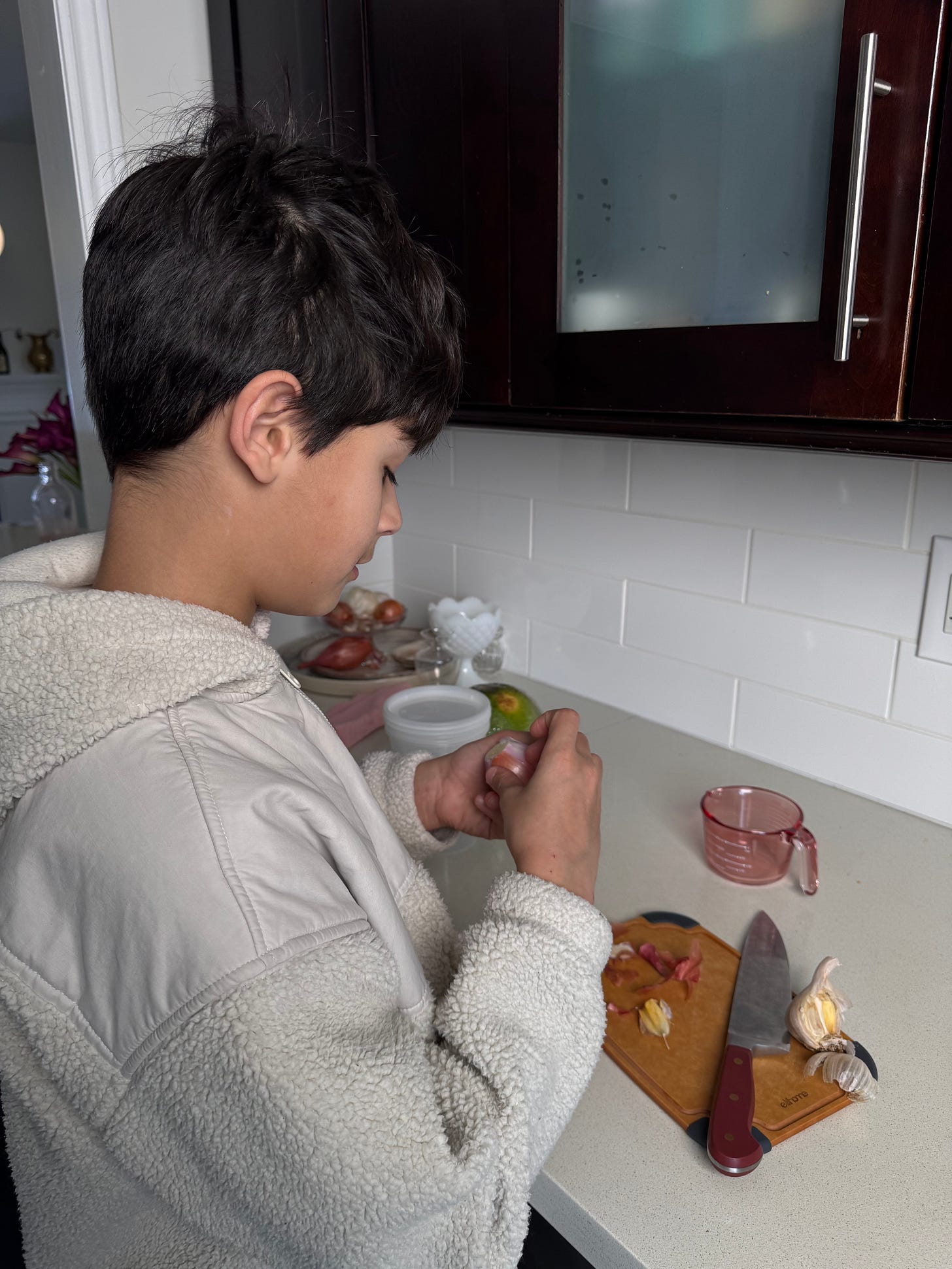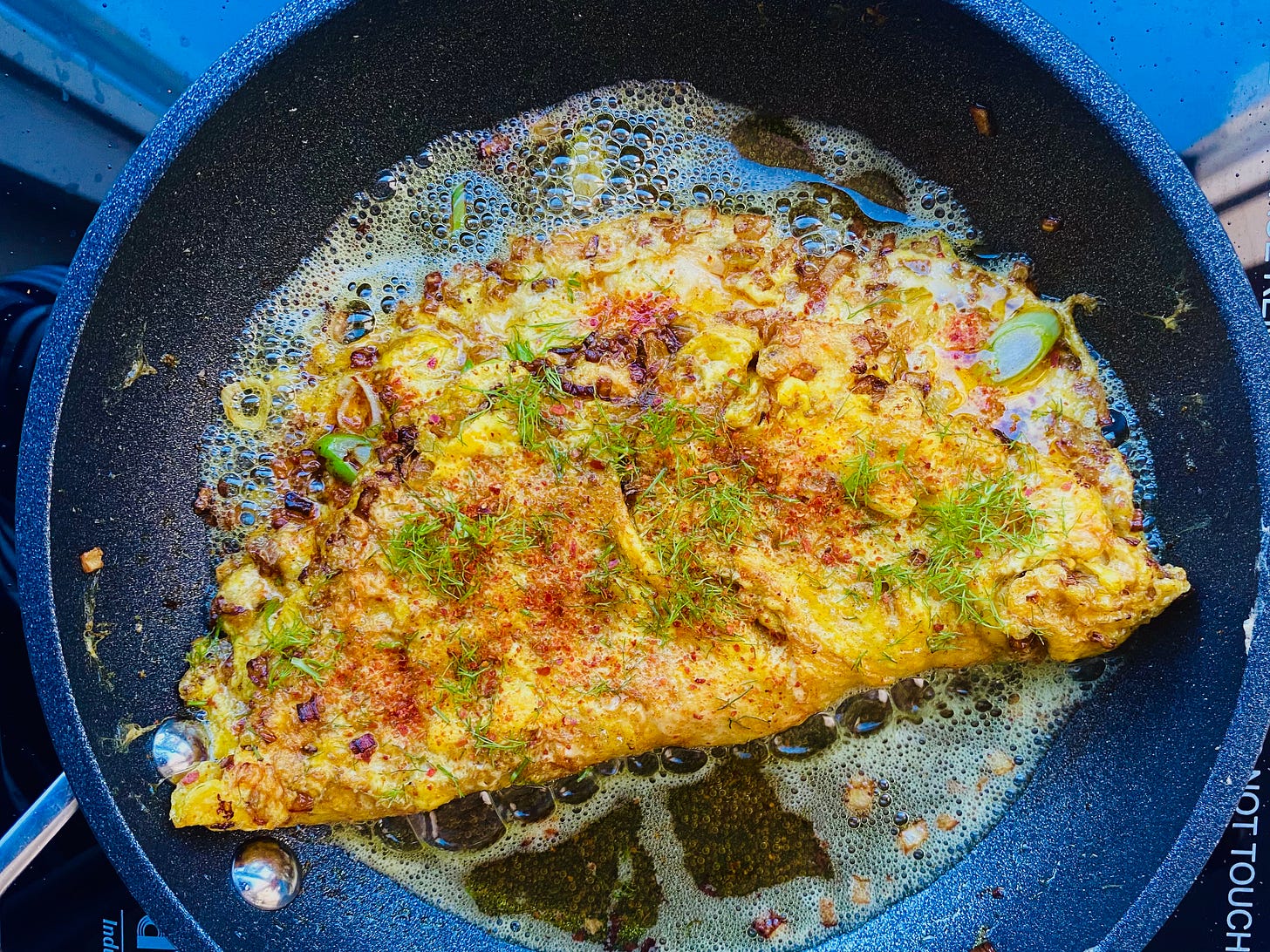I often think about the word legacy.
Sometimes it can feel heavy, as if it’s a weight passed down from one generation to the next.
Yet, for me, legacy lives in the rhythm of my hands, whisking eggs for my Ami’s Pakistani-style, spicy desi omelette, flecked with cumin, coriander, and green chilies. It’s in the way I stir a pinch of turmeric into the eggs, watching them transform from yellow to vermillion.
These are unspoken lessons from years spent watching Ami, and the women before her. It’s knowing when the onions are just right, turning golden in hot oil, or exactly how much coriander to chop, just by feel, by squeezing it in my palm.
But can the things we pass down sometimes feel too rigid, too fixed? Is there only one way to carry them forward?
For me, the legacy I want to leave my son, Evren, isn’t a strict set of rules. Of course, I want him to have my recipes—the ones he’s loved since he was a child, like my Cardamom Tea Cake.
But more than that, I want him to approach cooking with openness, creativity, and intuition.
I want us to spend weekend mornings in the kitchen, preparing a desi omelette, unencumbered by ipads, or cookbooks or notebooks, while listening to our favourite Japanese Jazz artist playlist.
Chopping, chatting—simply moving around the kitchen freely.
That is the beauty of cooking with andaza—the visceral knowledge of cooking by feel and memory.
It’s knowing when the edges of the egg in the skillet have set, so you can fold it into an omelette. There is no exactitude or manual for that. You just know.
I like to cook with the seasons, and eschew tomatoes in winter, (which my Ami always adds to her desi omelette). Instead, I lean into alliums like onions or shallots, and herbs from the farmer’s market—dill, coriander, or chives.
Evren and I make this omelette together on Sundays. I start by snipping the herbs with my scissors, while he peels the papery skin from the shallots, before he starts to mince them.
I crack the eggs into a bowl, handing it over for him to whisk, then reach into the cupboard for cumin seeds. Meanwhile, Evren looks in the pantry for the Korean gochugaru (that is his innovation).
The legacy I want to pass down to my son isn’t about perfection or instructions. It’s about giving him the tools to cook from andaza—to take the ingredients of his own life and transform them into something new. Something that feels like home, no matter where he is.
When the skillet is hot, I add the shallots and cumin seeds, and a sweet and nutty scent spreads through the kitchen. He pours the spiced egg mixture in, and we listen, as it sputters and bubbles.
I know when it’s time to fold it over.
It’s not about measurements. It’s about trusting what feels right—just like it did when Ami made it, and when I started cooking on my own.
Evren takes the spatula from my hand, “Mamma, I want to fold it over.” I pause, letting go, allowing him the space to shape this moment, to be his own cook.
The recipe for my Ami’s desi omelette changes with us, and that’s what makes it ours.
That’s the beauty of andaza, trusting the rhythm of the dish, knowing it will turn out fine, because it is a reflection of who we are.
The legacy I want to pass down to my son isn’t about perfection or instructions. It’s about giving him the tools to cook from andaza—to take the ingredients of his own life and transform them into something new.
Something that feels like home, no matter where he is.
So, I leave you with my Ami’s desi omelette recipe below, not because it’s the only way to make it, but because until we cook together in my kitchen, you’ll need something to guide you—her recipe, or at least a template to work from. It’s just a starting point. The real magic happens when you cook with andaza, trusting your own instincts along the way.
All love, Shayma x
Ami’s Desi Omelette
Serves 2
INGREDIENTS:
4 eggs
½ teaspoon ground turmeric
¾ teaspoon sea salt, or more, to taste
1 Thai bird green chili (finely chopped, deseed for less heat)
1 plum tomato (diced into ¼-inch pieces)
½ bunch fresh cilantro (roughly chopped, including leaves and stems)
½ small white onion or 1 shallot (finely chopped)
½ teaspoon whole cumin seeds
2 tablespoons neutral oil (e.g., avocado or grapeseed)
Fresh cilantro sprigs for garnish
PREPARATION:
Crack the eggs into a bowl and whisk them until fully combined. Add turmeric, salt, diced tomato, chopped cilantro, and green chili to the eggs and mix until evenly distributed. Heat oil in a medium skillet over medium-high heat, then add the onions. Sauté for 3-4 minutes until they soften and turn golden, ensuring they don’t brown too quickly. Add whole cumin seeds and stir for about 30 seconds to toast them, releasing their flavors. Pour the egg mixture into the skillet, spreading it evenly. Let the eggs cook undisturbed for 3-4 minutes until the edges begin to set and crisp up. Gently lift the edges with a spatula, allowing the runny egg in the center to flow underneath, ensuring even cooking. Once the omelette is mostly set with a soft center, fold it in half and cook for another minute to allow the inside to finish setting. Remove from the skillet and serve immediately, garnished with fresh cilantro.













